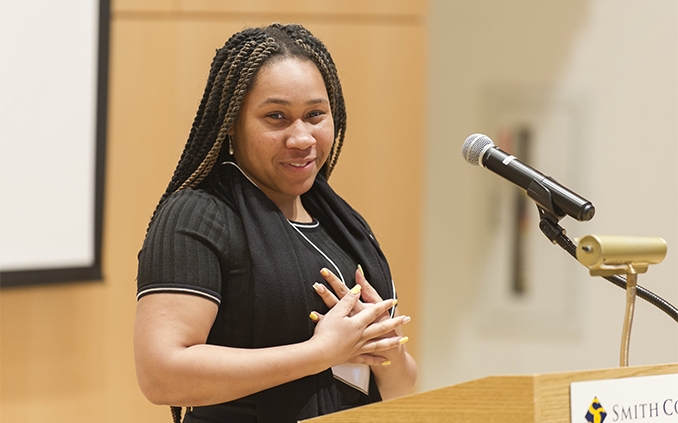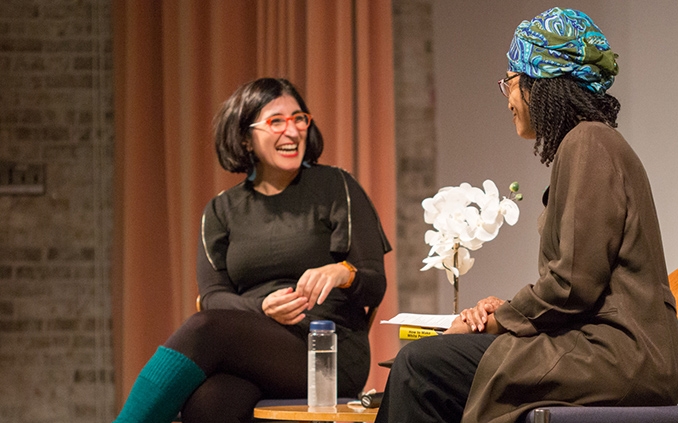Integrative Learning

Integrative Learning brings together multiple units at Smith College who share a mission to develop agency in Smith students and help them transform that agency into informed, purposeful action via the integration of their curricular and co-curricular experiences.
Integrative Learning Units
The current partners of the Integrative Learning team are the Conway Center, Design Thinking Initiative and Wurtele Center for Leadership. Our work is further informed by strategic collaboration with the Lazarus Center for Career Development and the director for reflective and integrative learning. This work is supported by a broader culture of curiosity, humility and reflection, which we seek to cultivate at the college.
Courses
The marriage of critical thinking and hands-on practice has informed our exciting collection of course offerings. See the Course Catalog for registration details.
IDP 116: Introduction to Human Centered Design
In this introductory course we explore what designing towards justice might look and feel like. Students will employ human-centered design, a process that centers the lived experience of people most impacted by a challenge in creatively addressing it. We will look at the implications of design in shaping the world around us and develop a critical lens on designs' role in making change. Students will explore what it means to re-frame challenges as opportunities, engage in humble inquiry, observe in new ways, synthesize qualitative research, co-generate ideas, prototype, and test their designs. Enrollment limited to 16. 1 credit; S/U only
IDP 132: Designing Your Path
Whether you are starting your Smith journey, embarking on or returning from an immersive experience abroad, weaving your interests through a Concentration or self-designed major, or wrestling with expressing what a Smith education has prepared you to do, this is the class for you. Test different integrative paths of your own design, tell your own story, and create a digital portfolio to showcase your work. By the end of class, you will be able to articulate connections between your work in and outside of the classroom, and to explain how Smith is preparing you to engage with the world beyond. Enrollment limited to 12.
IDP 133: Critical Perspectives on Collaborative Leadership
This course challenges students to interrogate the perceived dichotomy between leading as a solitary versus collaborative endeavor. Together, we will examine theories and histories of leadership and collaboration through a critical lens and explore alternative ways of imagining change-making as a collaborative leadership act. Through reading, writing, reflection, and practice, the class will offer students new perspectives on how they might lead collaboratively. Recommended as a foundation for students whose future academic work is likely to include significant group work. Enrollment limited to 40.
IDP 134 Examining Equity and Action-Based Design for Leaders
This course provides students with a theoretical foundation in critical dialogue around issues of power and systemic oppression in relation to socially just leadership and designing for social change. Students will explore early messages, personal narratives, identity formation, the intersection of identity and leadership and how these categories relate to creating an equitable and inclusive community. This is the first semester of a year-long cohort program: Leading for Equity and Action-Based Design (LEAD) Scholars Program, a leadership program for students sponsored through the partnership of the Office for Equity and Inclusion and the Wurtele Center for Leadership. 1 credit
IDP 135 Examining Equity and Action-Based Design for Leaders 2
This course provides students with both a theoretical and practical foundation in facilitation and design for social change. Students will learn human-centered and equity-centered design principles, as well as different modes of facilitation. This is the second semester of a year-long cohort program: Leading for Equity and Action-Based Design (LEAD) Scholars Program, a new leadership program for students sponsored through the partnership of the Office for Equity and Inclusion and the Wurtele Center for Leadership. Prerequisite: IDP 134. Enrollment limited to 20. Instructor permission required; S/U only
IDP 146: Critical Perspectives on Entrepreneurship
Entrepreneurship takes on a diversity of meanings, forms and structures depending on its source and context. In this course, the topic of entrepreneurship is studied from a variety of critical and under- explored vantage points such as ethics, access, inclusion, culture, power, expression, agency, economic empowerment, cultural and social transformation. Entrepreneurship is counter-mapped from an inter-, intra- and multi-disciplinary lens from the liberal arts tradition and the course examines the commonalities that connect both. The potential of entrepreneurship to create sustained social transformations is critically examined alongside its unique identity within and outside of the realm of economic exchange. *Not offered AY 22-23.
IDP 155: Entrepreneurship I - Introduction to Innovation
In this course, students will begin a journey towards developing an entrepreneurial mindset gaining immediate experience with entrepreneurial innovation by generating bold solutions to problems. Students will be challenged to think about ventures that address a new and just world post COVID-19 using the 17 UNSDGs as a framework for their projects. Students will also analyze cases about real entrepreneurs and explore their challenges, obstacles and ethical decision making. This course is designed around individual and team-based assignments that culminate in final team presentations. Enrollment in IDP 116 is encouraged but not required. Enrollment limited to 30. 1 credit; S/U only
IDP 156: Entrepreneurship II - Entrepreneurship in Practice
Building on IDP 155, students will continue developing an entrepreneurial mindset by exploring the process of planning, testing and iterating on their unique ideas, and learning the innovative Lean Launch methodology. Teams will begin mapping their ideas using the Business Model Canvas and the Value Proposition Canvas. Students will be exposed to the Failure Spectrum and analyze cases about failure. Students work in teams to complete daily homework assignments and a final presentation. This course is designed around individual and team-based assignments that culminate in final team presentations. Enrollment in IDP 116 and IDP 155 is encouraged but not required. Enrollment limited to 30. 1 credit; S/U only
IDP 232 Articulating Your Path
This course is for students who have completed IDP132 Designing Your Path or another Smith experience that allowed for reflection on curricular and experiential work, values and goals. Here, students will begin to look outward. After reviewing and assessing important learning experiences, you will conduct qualitative interviews to gain a multidimensional understanding of your discipline in the world. At the same time, you will create a "personal syllabus," a reflection on maintaining and pursuing curiosity. Finally, you will make a narrative digital portfolio and gain experience with public voice through an op-ed, TED talk or other piece of media. Prerequisites: IDP 132. Enrollment limited to 12. Instructor permission required
IDP 316: Critical Design Thinking Studio
This project-based collaborative studio emphasizes a design process that engages those most impacted by a given design scenario in creatively and collaboratively designing possible new scenarios that benefit both people and the planet. We will take a critical look at the impact of design on the world around us and how the field is evolving. We will develop our own perspectives on designs' role in shaping the future by investigating design narratives, contemporary practices, and emerging frameworks. Together we will explore what it means to frame and reframe challenges as opportunities, attune our awareness, practice listening with humility, heighten our observation skills, engage stakeholders, synthesize qualitative research, co-generate ideas, make those ideas tangible through prototyping, test our concepts with people in context, give and receive feedback, and communicate our designs.
Co-Curricular Activities
Student agency is translated into action through the integration of co-curricular knowledge and experiences that are guided by a student’s personal values in tandem with a commitment to the well-being of people and the planet.
- Community Conversations (Conway Center)
- C-Series (Wurtele Center)
- Prototyping Studio (Design Thinking Initiative)
Opportunities
Amplify
The Wurtele Center’s Amplify initiative gives students the skills they need to share their knowledge and perspectives with a public audience.
View moreDesign Immersions
The Design Thinking Initiative’s Global Design Immersions pairs Smithies with organizations committed to making an impact through human-centered design.
View moreDraper Competition for Collegiate Women Entrepreneurs
The Draper Competition is an on-ramp for undergraduates seeking access to entrepreneurship opportunities.
View moreStudent Project Scholarship Fund
The Conway Center provides scholarships for students interested in supplementing their entrepreneurial or financial/business education.
View more


